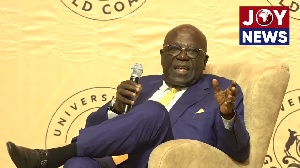Africa News of Friday, 4 April 2025
Source: www.ghanawebbers.com
Chad: Urgent AU Action Could Defuse Rising Chad-Sudan Tensions
Mediation by the African Union's High-Level Panel on Sudan could help end the conflict. It may also strengthen regional security.
The civil war in Sudan began in April 2023. The United Nations warned that the conflict could spread beyond Sudan's borders. Recently, threats from the Sudanese Armed Forces (SAF) against Chad and South Sudan have increased this risk.
Last week, SAF Deputy Commander General Yasir al-Atta called Chad's airports legitimate targets. His statement came amid ongoing support for the rival Rapid Support Forces (RSF). Initially, neighboring countries remained neutral, but a 2024 UN report confirmed Chad's support for the RSF.
The SAF accuses Chad of being a logistical hub for the RSF. They claim Chad is working with the United Arab Emirates (UAE) to supply weapons and drones to the RSF. Both Chad and the UAE deny these allegations.
In response to al-Atta’s comments, Chad’s Foreign Affairs Ministry expressed readiness to retaliate. Prominent Chadian figures echoed this sentiment, calling it a declaration of war. On March 29, Chad’s military stated they viewed his remarks as an act of aggression.
Sudan and Chad share a 1,360 km border with deep cultural ties. However, their relationship has been marked by proxy wars and tensions over time.
Chad is emerging from a contested transition after former president Idriss Déby Itno's death in 2021. His son took over but is still establishing legitimacy for the government.
Sudan has faced turmoil since the coup that ousted Omar al-Bashir in 2019. The country is now engulfed in civil war and struggling with state-building efforts.
Both nations lack resources for a regional war; such a conflict would be catastrophic.
Preventive measures are crucial to de-escalate tensions between Sudan and Chad. While SAF statements may reflect recent battlefield gains, historical tensions raise concerns about potential conflicts.
One possible scenario involves armed conflict between both countries. With recent successes against RSF forces, SAF might expand its military efforts westward. Instead of ground attacks, Sudan could threaten Amdjarass airport using drones, prompting retaliation from Chad.
However, even if willing, SAF may hesitate to open another front against Chad due to current challenges with RSF forces. The army has around 100,000 troops stretched thin across various fronts in Khartoum and elsewhere.
Chad does not face an internal conflict like Sudan but still faces security risks along its borders. Its National Army has about 37,000 troops engaged against Boko Haram and rebel groups in northern regions.
A second likely scenario involves returning to proxy wars through rebel groups as seen under past leaders Déby and al-Bashir. These conflicts destabilized both nations significantly in previous years.
For instance, Chadian rebels supported by Sudan attacked N'Djamena during earlier conflicts while Sudanese rebels reached Omdurman before being repelled in May 2008.
In this scenario, SAF might use Darfur Joint Forces to target N'Djamena; however, RSF control over Darfur complicates this option significantly.
Alternatively, SAF could arm Chadian rebels suspected by N'Djamena for months now. Many fighters from past rebellions could mobilize if offered payment or incentives along shared borders with Central African Republic-Sudan areas where armed groups operate freely.
Both scenarios would have serious consequences for communities on either side of the border. Increased violence would worsen humanitarian conditions already strained by limited aid availability and displacement risks among local populations.











